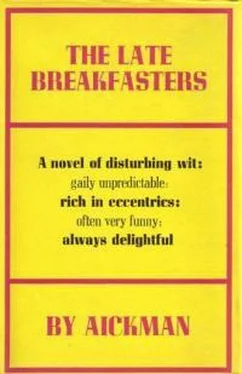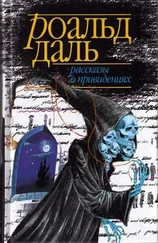‘Thank you,’ said Griselda, taking the glass Mr Tamburlane extended to her. ‘What is Miss Otter’s news?’
‘That,’ said Mr Tamburlane swallowing his rum at a gulp, ‘I do not know. Miss Otter wrote to me that she will look in this morning to impart it in person. It must be something quite unconventional, because, as you know, this is not Miss Otter’s day.’
‘And that’s all you know?’
‘Enough is as good as a feast, Miss de Reptonville. I counsel you to watch and pray. Although unswervingly antagonistic to an anthropomorphic theogony, I often find purgatation in the precepts of the primitives.’
‘Some more posset, Mr Tamburlane?’
‘Thank you, no. Warmth is already reanimating the various segments of my trunk. Nor, I conceive, should we continue imbibing stimulants until incapacity overtakes us. We should recollect that the hour for toil has but just now chimed; and summon forth our full self-mastery. Or do you differ?’ He sat anxiously interrogative, with the bottle clasped motionless in the air between them.
‘Far from it, Mr Tamburlane. I agree entirely.’
‘What a reassurance that is to me. My inner demon has in it that which could so easily sweep all resistance away like chaff – which indeed on more than one occasion has swept it away like chaff – that I fear constantly the thickness of my own right arm.’ The bottle still hung in the air.
‘I think we have a customer.’
‘Then let all be apple pie and shipshape.’
Griselda drained her glass. She did not care for the coconut rum, because it tasted of coconut.
A young man had been standing outside the shop, looking in the window and hesitating. At first Griselda feared it might be Dennis Hooper, come with persuasive protestations of repentance; but it proved to be a young man looking for a chart of the Blackwater Estuary. From his demeanour outside and inside, it was clear that, like many of the customers, he seldom entered a bookshop.
‘Charts, Mr Tamburlane?’
Mr Tamburlane ran both hands through his upstanding white hair. ‘Try in there, Miss de Reptonville.’ Griselda suspected that he had decided entirely by intuition.
‘Nothing but almanacs,’ said Griselda rumaging.
‘I always like to keep a stock of almanacs for past years,’ said Mr Tamburlane to the customer in a spirit of affable salesmanship. ‘I am, I believe, the only London bookshop to do so.’
The young man simply nodded. He was in a subdued frenzy for a chart of the Blackwater Estuary.
‘It’s ideas such as that, I always like to think, which set one apart from one’s competitors.’
‘I want some idea where she dries out,’ said the young man anxiously. His eyes followed Griselda round the shop. It was clearly a matter of immense moment.
‘I’m so sorry,’ said Griselda. ‘I’m afraid we’ve sold out that particular one just at the moment. Shall I order it for you?’
‘My dear boy,’ said Mr Tamburlane, laying his hands on the customer’s arm. ‘For a sailor who has youth, there are always the stars.’
Miss Otter failed to arrive.
Griselda, although she had never, except at the very beginning, dared to take that particular ridiculous business in the least seriously, found by midday that she was taking it seriously enough to feel sick.
She had nothing for lunch but bananas and cream, and a cup of black coffee. When she returned through the fog to the shop, she was even more alarmed to perceive that Mr Tamburlane seemed really upset.
‘Miss Otter is invariably the very figurehead of punctilio. You could, if I may employ a daring concept at such an anxious moment, use her as a regulator for a clock.’
‘Did Miss Otter not mention any time?’
‘Tomorrow morning,’ said Mr Tamburlane. ‘Yesterday, you understand.’
‘What about telephoning?’
‘Out of the question. Miss Otter will have nothing electrical in the house.’
‘Perhaps she dislikes fog and has stayed at home.’
Mr Tamburlane’s face lighted up. ‘Miss de Reptonville!’ he cried. ‘I believe you have hit it.’
At a quarter past four, when it was quite dark, a stranger entered the shop and asked to speak to Mr Tamburlane. Griselda showed him into the back room and went on dealing with the arrears of orders sent by post.
About half an hour later, Mr Tamburlane emerged, wearing his overcoat and scarf and looking altogether distraught. ‘All is over,’ he exclaimed. ‘Kindly put up the shutters immediately. Miss Otter has been run over by a postal van. I am informed that it was behind schedule owing to adverse weather.’
‘Then,’ cried Griselda, ‘shall I never know—?’
Mr Tamburlane raised his hand. ‘Please say no more, Miss de Reptonville, lest it be taken down and used in evidence against me.’
‘Come along, please,’ said the visitor.
Griselda looked at his feet, which she had once read was the right thing to do; but could see nothing unusual. ‘What is the charge?’ she asked.
‘That has been under discussion with this gentlemen for the last half-hour,’ said Mr Tamburlane. ‘It appears that the authorities have visited Miss Otter’s house and drawn their own conclusions. Entirely false ones, I am sure I need not add.’
‘Come along, please,’ said the visitor.
‘Cut is the bough that might have grown full straight.’ Mr Tamburlane extended both his hands.
‘What can I do to help? Please tell me?’
Mr Tamburlane suddenly became transfigured with an idea. ‘Officer,’ he said, ‘may I write a letter?’
‘Time we was on our way.’
‘Only one line.’ Mr Tamburlane looked exactly like half-a-crown.
‘Make it short.’
It was very short.
‘Miss de Reptonville this is what you shall do. You shall not read this until five minutes after I am gone. Five minutes by any timepiece you choose.’ He had rolled the letter into a spill. Griselda took it. The visitor was looking vainly for his half-crown. ‘Promise.’
‘I promise.’
‘Get going,’ said the visitor sourly. ‘We don’t go for your class of offence, you know.’
A woman entered the shop. ‘I want a copy of Reader’s Digest for my little boy.’
Mr Tamburlane put on his astrakhan hat and cleared his throat. ‘Tell me,’ he said to his companion, ‘did you find time to visit Sing-sing this summer?’
When the five minutes were spent, Griselda uncurled the letter. Mr Tamburlane had spoken the exact truth. Apart from his signature it consisted of a single line.
‘I hereby give my shop and all its contents to Bearer.’
XXVIII
Griselda made diligent enquiries, partly in the forlornest possible hope that she might extract some news of Louise, partly out of gratitude to Mr Tamburlane. But she found all channels blocked; largely, it seemed, at the particular direction of the accused. In the end she realized that in his own way Mr Tamburlane had disappeared from her life as conclusively as Louise.
Often, however, as she served in the shop, her thoughts turned to him. She was advised in the particular circumstances to adopt another name for the business as soon as possible; and through much of a cold December week, the versatile Lena, clad in motorcycling costume, painted out ‘Tamburlane’ and substituted ‘Drelincourt’. This was because Griselda had invited Lena to go into partnership with her, and had no particular conviction that her own was a suitable name to place above a London shop. Already, after only a fortnight, Lena’s knowledge of literature had proved as valuable as her capacity for odd but essential jobs. Griselda had insisted on placing in the window ten copies of Inhumation (ordered without Lena’s knowledge) on the very first day; and, oddly enough, by the end of the second day all were sold, and another ten had been ordered, to the conspicuous vindication of Griselda’s commercial judgement and acquired experience of the trade.
Читать дальше




![Роберт Эйкман - Холодная рука в моей руке [сборник litres]](/books/438747/robert-ejkman-holodnaya-ruka-v-moej-ruke-sbornik-l-thumb.webp)





